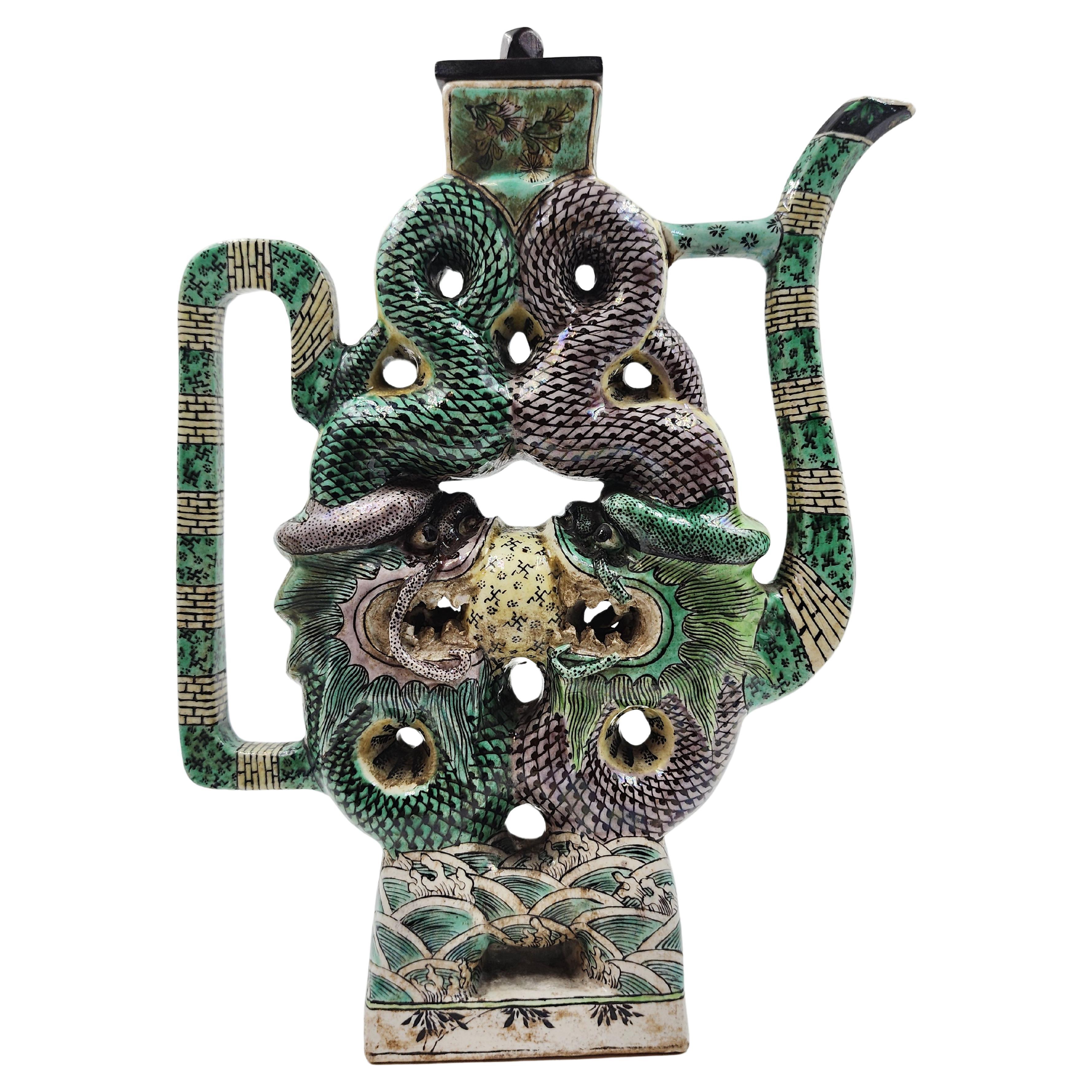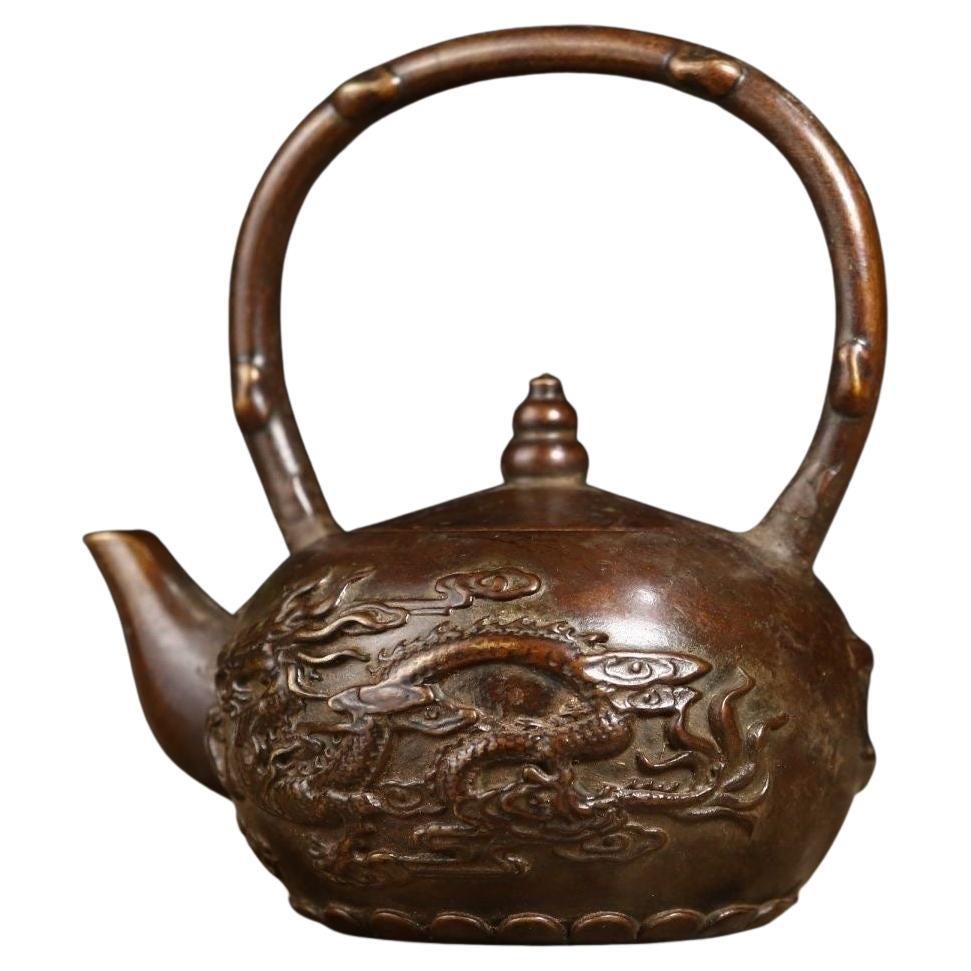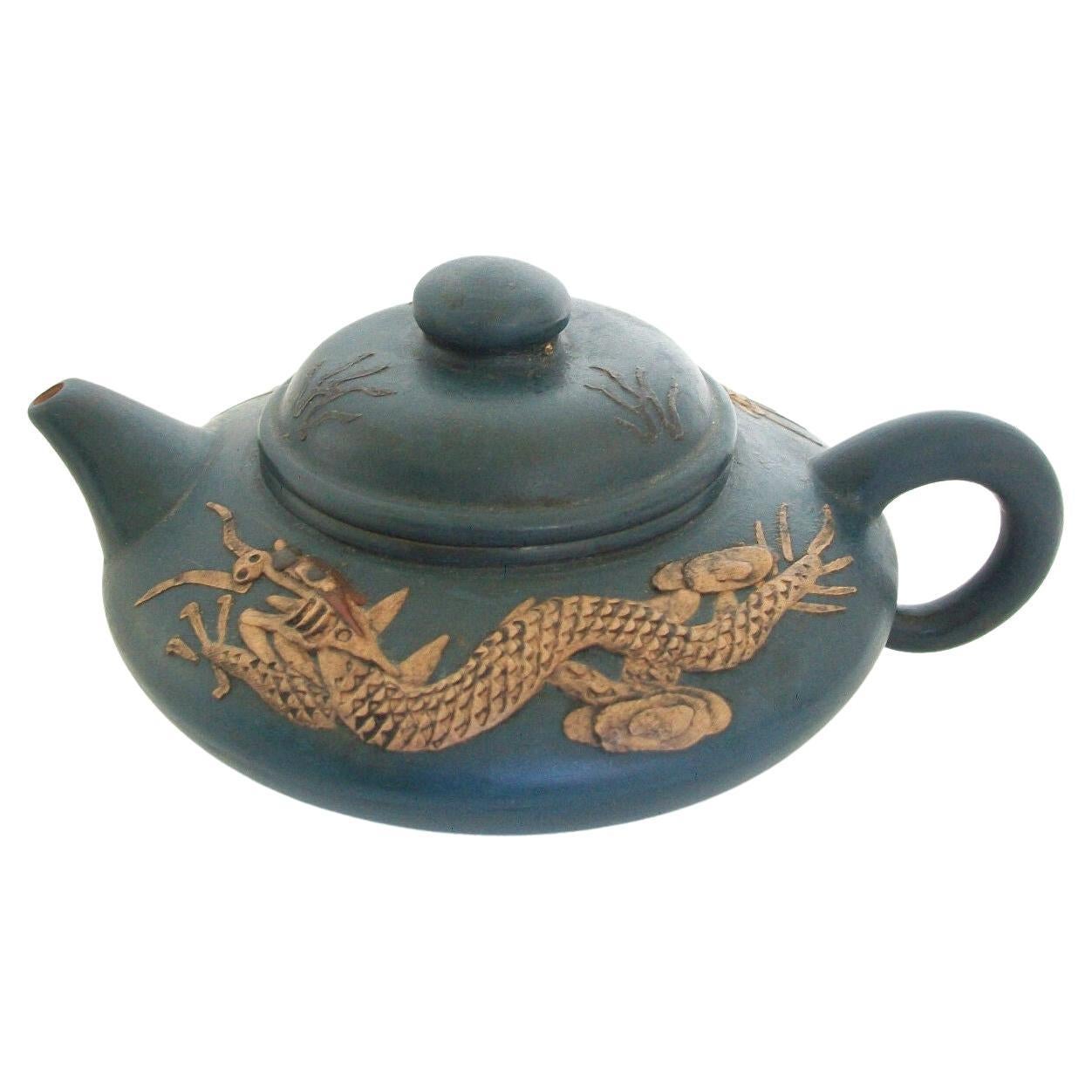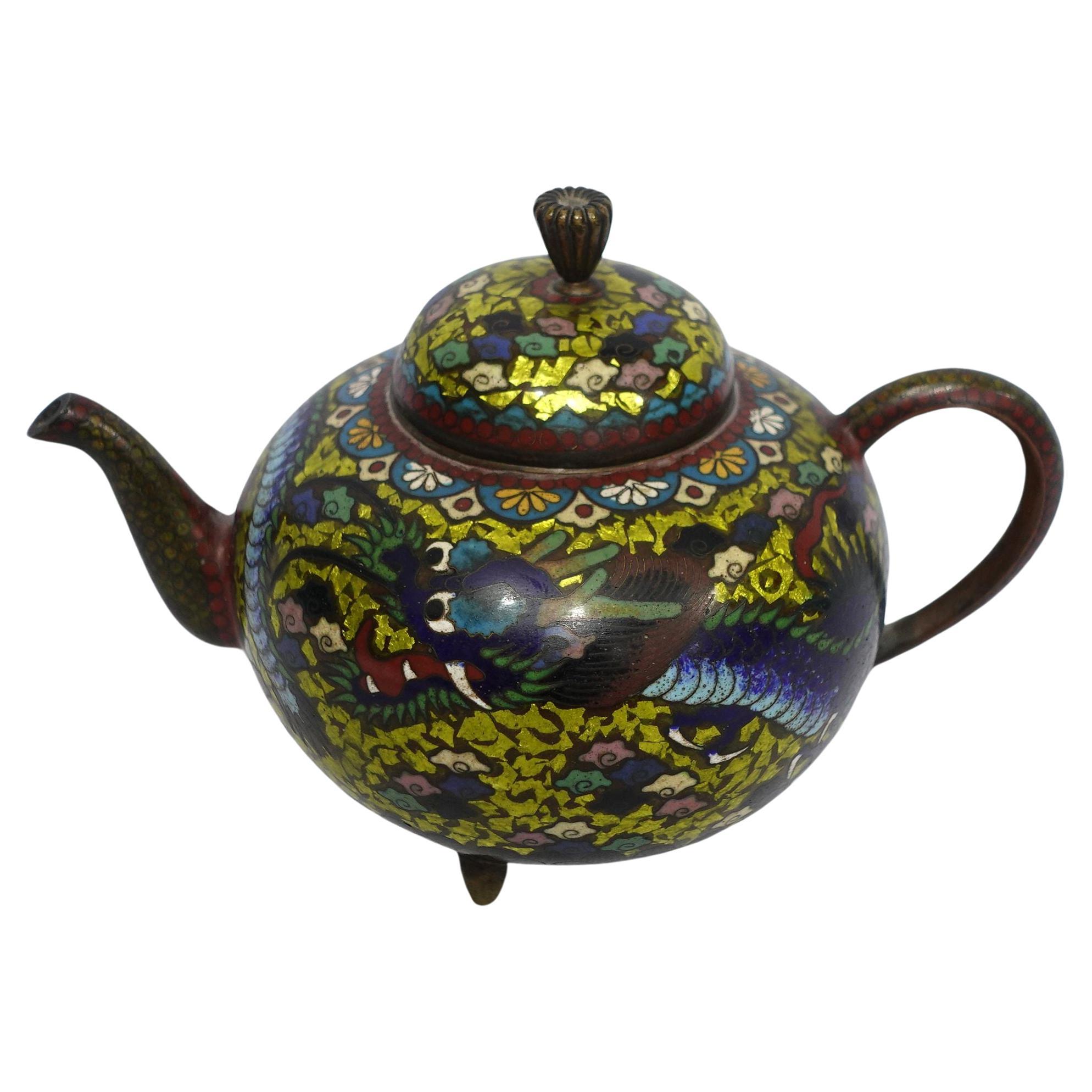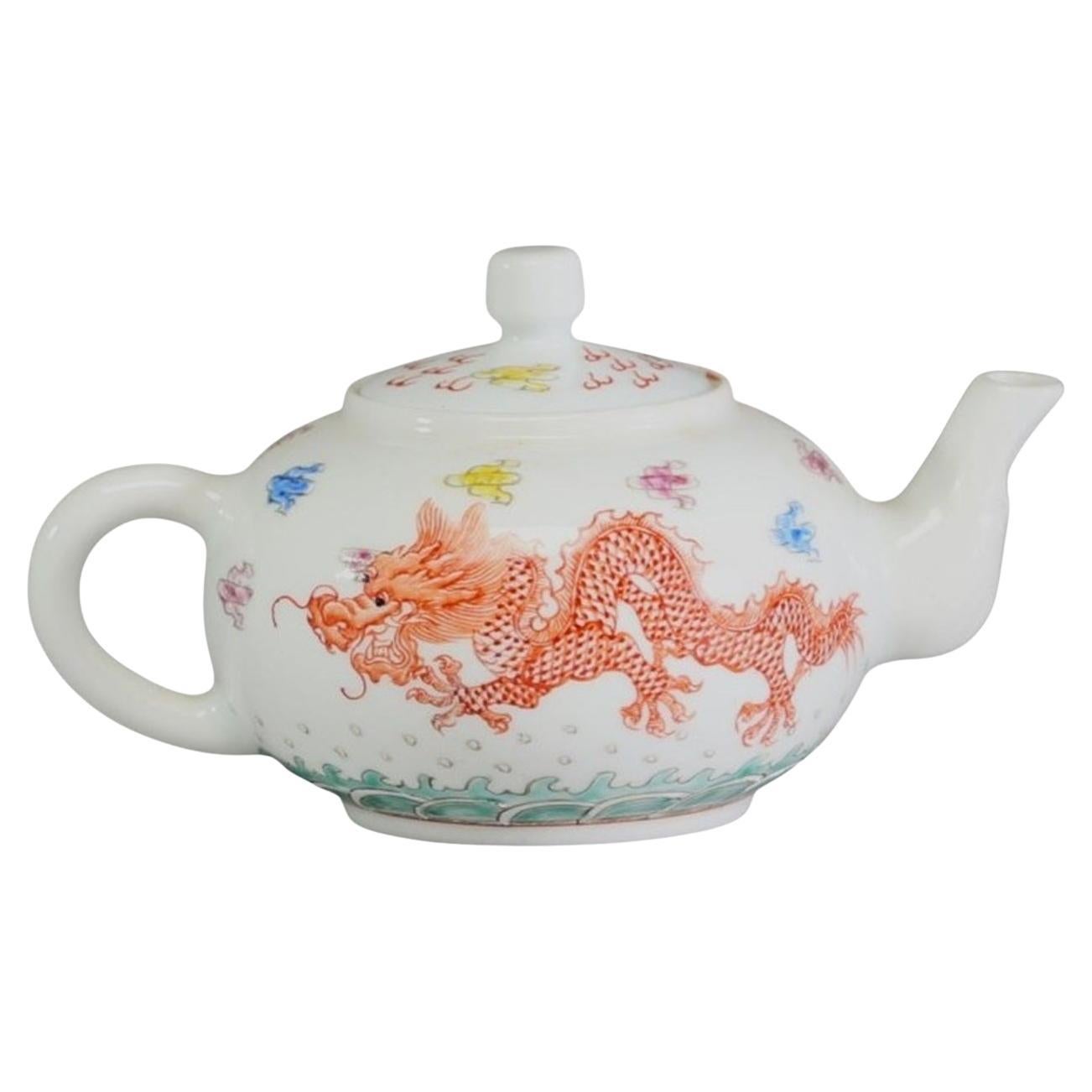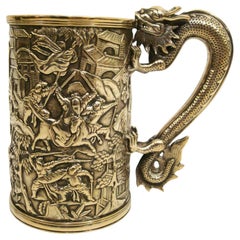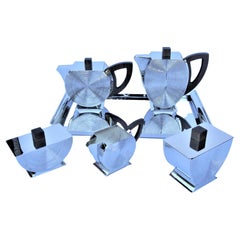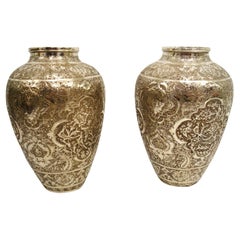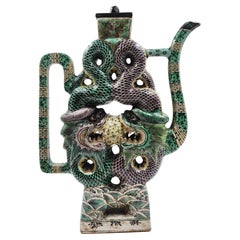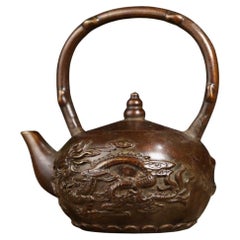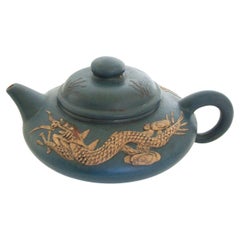Items Similar to Chinese Cadogan 'Foo Dog' Teapot, Guangxu Tea / Coffee
Want more images or videos?
Request additional images or videos from the seller
1 of 18
Chinese Cadogan 'Foo Dog' Teapot, Guangxu Tea / Coffee
$1,600
£1,215.24
€1,404
CA$2,242.46
A$2,509.73
CHF 1,309.89
MX$30,605.79
NOK 16,764.77
SEK 15,870.01
DKK 10,477.89
Shipping
Retrieving quote...The 1stDibs Promise:
Authenticity Guarantee,
Money-Back Guarantee,
24-Hour Cancellation
About the Item
Chinese turquoise and Aubergine glazed Cadogan wine or tea pot
A finely molded and glazed "Cadogan" wine or tea pot. The body is glazed in a rich turquoise color. China, Guangxu period, shaped as a foo dog holding a stool. Funnel underbase with orifice.
The handle and spout molded as a leafy branch.
Chinese porcelain Cadogan 'Foo Dog' Teapot, Guangxu Tea, coffee.
It has a hole under it from where you fill it with liquid (water), the liquid doesn´t comes out.
It has a stamp under it.
Conditions are shown on the pictures.
We have specialized in the sale of Art Deco and Art Nouveau and Vintage styles since 1995. If you have any questions we are at your disposal. Pushing the button that reads 'View All From Seller'. And you can see more objects to the style for sale. Why are there so many antiques in Argentina?
In the 1880 – 1940 there was a grate wave of immigration encouraged by the periods of war that were taking place. 1st World War took place between 1914 and 1918 2nd World War took place between 1939 and 1945 The immigrants options were New York or Buenos Aires. Tickets were cheap and in Buenos Aires they were welcomed with open arms, as it was a country where everything was still to be done. Argentina was the country of new opportunities, labour was needed and religious freedom was assured, in many cases the of the family travel first until they were settled and then the rest of the family members join them. In the immigrant museum “Ellis Island Immigrant Building” in New York you can se the promotional posters of the boats that would take them to a new life. Between the years 1895 and 1896, Argentina had the highest DGP (gross domestic product) per capita in the world according to the Maddison Historical Statistics index, this situation arose due to the large amount of food being exported to European countries, which were at war. The Argentinean ships left the port of Buenos Aires with food, but they returned with furniture, clothes and construction elements, (it´s common to see this the old buildings of the historic neighbourhood of San Telmo, the beams with the inscription “Made in England)”, as well as many markets that were built in Buenos Aires, such us the San Telmo Market, whose structure was brought by ship and afterwards assembled in 900 Defensa Street. With the great influence of European immigrants living in the country, the children of the upper classes travelled to study in France, resulting in the inauguration of “La Maison Argentinienne”, on 27th of June 1928, in the international city of Paris, which hosted many Argentinians that were studying in Frace. It´s the fourth house to be built after France, Canada and Belgium, being the first Spanish-speaking one. Still in place today (17 Bd Jourdan, 75014, Paris, France). Many of the children of these wealthy families who attended international art exhibitions, museums and art courses abroad, took a keen interest in the European style. This is why Buenos Aires was at the time referred as “The Paris of South America”. Between the years 1890 and 1920 more than a hundred Palaces were built on Alvear Avenue the most exclusive avenue in Buenos Aires. Today some of these palaces have been transformed into museums, hotels and embassies. In the year 1936, the Kavanagh building was inaugurated, it was the tallest reinforced concrete building in South America. During 1994 the American Society of Civil Engineers distinguished it as an “international engineering milestone”, and it´s now considered a World Heritage of Modern Architecture. At the time was common to hire foreign architects such as Le Corbusier, who visited Buenos Aires/Argentina in 1929 and in 1948 he drew up the blueprints for a house built in La Plata City (which was declared a World Heritage Site). In 1947, the Hungarian architect Marcelo Breuer designed “Parador Ariston” in the seaside city of Mar del Plata. After an Argentinean student at Harvard University convinced him to come to Argentina. He worked on an urban development project in the Casa Amarilla, area of La Boca. The Ukrainian architect, Vladimiro Acosta, arrives in Argentina in 1928 and worked as an architect until que moved to Brazil. Antonio Bonet, a Spanish architect who worked with Le Corbusier in Paris, arrives in Argentina in 1937, where he carried out several architectural works and in 1938 designs the well-known BFK chair. Andres Kálnay, of Hungarian origin, made around 120 architectural masterpieces, among which the former Munich brewery stands out, he even made the furniture’s design. The German architect, Walter Gropius, director of the Bauhaus, lived in Argentina, where he wrote articles for “Sur” magazine and founded in Buenos Aires, an architectural firm with Franz Möller, who was also an architect, where he built two houses. At the same time several famous designers decided to immigrate to Argentina, among them we can find the well-known French designer, Jean-Michel Frank, who arrived in the country in 1940 and also worked for the Rockefeller family. Special pieces were made, which were sold exclusively in the country, such as the well-known German company “WMF”, who sold their products by catalogue, which were chosen by the ladies of high society in the list of wedding gifts, as well as the pieces designed by Christofle. The Swiss sculptor Alberto Giacometti, made special pieces for Argentinean mansions. In 1904 the first Jansen branch outside Paris was established in Buenos Aires, as the Argentinean clientele demanded a large amount of furniture, from the end of the 19th century to the mid-20th century. In 1970, the brand Rigolleau Argentina made pieces authorised by Lalique. The brands Maple and Thompson also set up shop in the country. The French plastic artist, Marcel Duchamp moved to Argentina in 1918-1919. Glass signed Gallé, Charder, Leverre, Schneider, Muller and other French firms. They were bought in flower shops and were given to ladies with beautiful floral arrangements. Some furniture manufacturers travelled to international fairs and bough the patterns to produce the furniture in Argentina, such as the furniture firm Englander and Bonta, who bought the patterns in Italy. It is worth mentioning that in Argentina we have the largest community of Italians outside of Italy, as it is estimated that 70 percent of the inhabitants have at least one Italian descendant, followed by Spanish immigrants. The most Important furniture stores in Argentina: Comte is founded in 1934 (under the direct management of Jean Michel Frank in 1940). Nordiska (Swedish company established in 1934). Churba in 1960, a company that brought foreign designers to present their furniture in the country: Denmark: (Arne Jacobsen, Finn Juhl, Bender Madsen, Ejner Larsen, Poul Kjaerholm, Hans Wegner) Sweden: (Hans Agne Jakobsson, Gustavsberg) United States: (Herman Miller) Finland: (Lisa Johansson, Folke Arstrom, Tapio Wirkkala, Alvar Aalto, Timo Sarpaneva) Swedish Factory: (Orrefors) Italy: (Littala, Vico Magistretti, Emma Gismondi, Gae Aulenti, Angelo Mangiarotti, Elio Martinelli, Gianna Celada, Angelo Mangiarotti, Mario Bellini, Carlo Scarpa) Finland: (Olivia Toikka) Plata Lappas (Lappas Silver): a goldsmith shop founded in 1887 in Argentina by Alcibiades Lappas of Greek origin. In 2019, in Argentina took place “the Art Deco world congress” . Argentina currently has more than 100 Art Deco buildings and another 90 Art Nouveau buildings throughout the city of Buenos Aires. Argentina is a country that has not been involved in many wars, which is why it has been a refuge for works of art and antiques from different periods of time, unlike European countries. That is way many collectors, museums and antique dealers from all over the world visit it, you should not miss the opportunity to visit this great country.
- Dimensions:Height: 8.27 in (21 cm)Width: 8.67 in (22 cm)Depth: 3.15 in (8 cm)
- Style:Chinese Export (In the Style Of)
- Materials and Techniques:Ceramic,Glazed
- Place of Origin:
- Period:
- Date of Manufacture:1880-1900
- Condition:Wear consistent with age and use.
- Seller Location:Buenos Aires, AR
- Reference Number:1stDibs: LU2027317892851
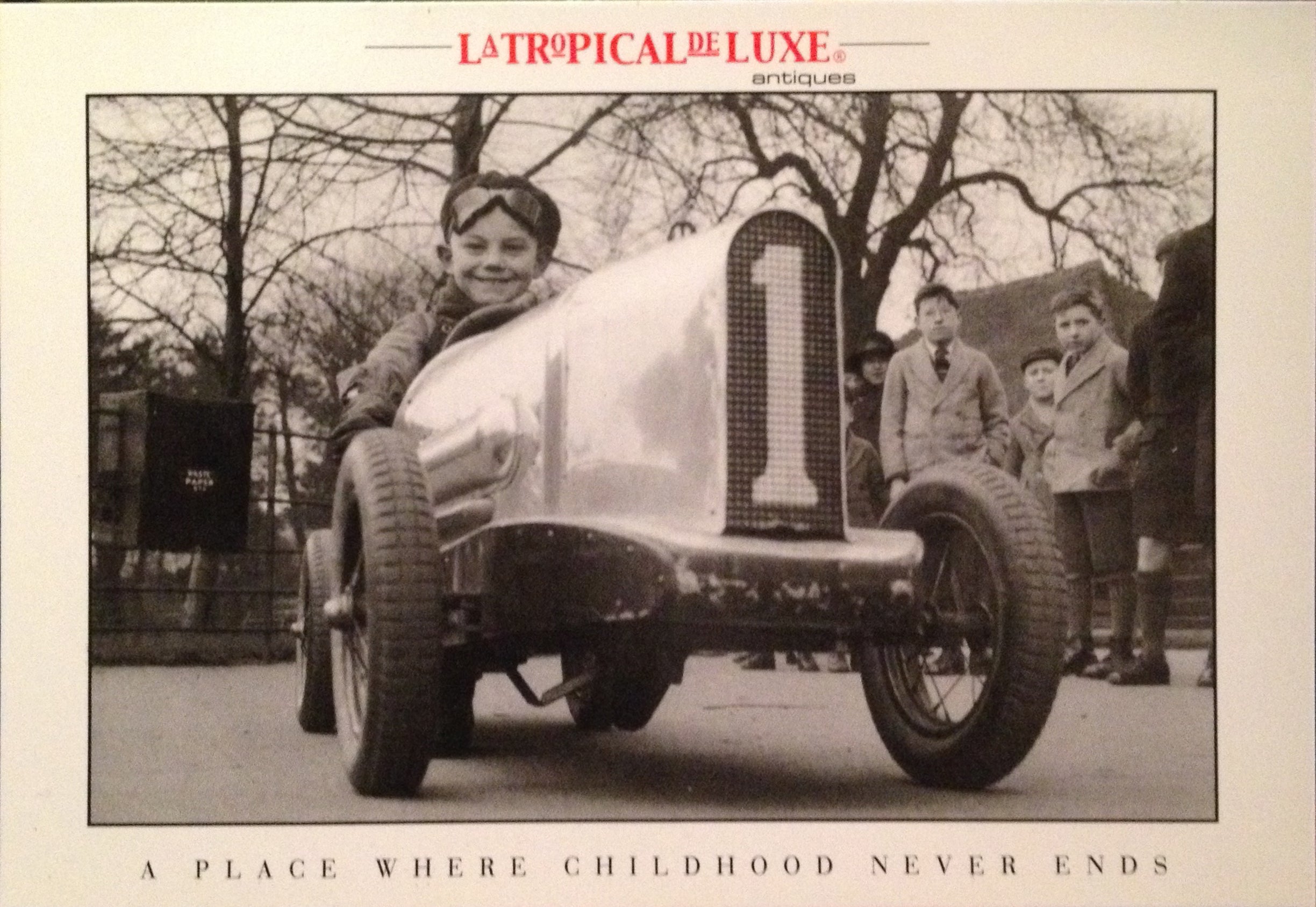
About the Seller
4.9
Vetted Professional Seller
Every seller passes strict standards for authenticity and reliability
Established in 2002
1stDibs seller since 2016
320 sales on 1stDibs
Typical response time: 1 hour
- ShippingRetrieving quote...Shipping from: Buenos Aires, Argentina
- Return Policy
Authenticity Guarantee
In the unlikely event there’s an issue with an item’s authenticity, contact us within 1 year for a full refund. DetailsMoney-Back Guarantee
If your item is not as described, is damaged in transit, or does not arrive, contact us within 7 days for a full refund. Details24-Hour Cancellation
You have a 24-hour grace period in which to reconsider your purchase, with no questions asked.Vetted Professional Sellers
Our world-class sellers must adhere to strict standards for service and quality, maintaining the integrity of our listings.Price-Match Guarantee
If you find that a seller listed the same item for a lower price elsewhere, we’ll match it.Trusted Global Delivery
Our best-in-class carrier network provides specialized shipping options worldwide, including custom delivery.More From This Seller
View All19 Century Chinese Export silver Dragon-Handled Mug / Tankard
Located in Buenos Aires, Olivos
19th Century Chinese Export Silver Mug / Tankard, the sides are beautifully decorated in relief with a scene of warriors in combat, very crisp and detailed, centering a shaped cartou...
Category
Antique Mid-19th Century Chinese Chinese Export Metalwork
Materials
Silver
$2,280 Sale Price
40% Off
Art Deco Five-Piece Tea and Coffee Set with Wood Handles and Tray
By Argentor of Vienna
Located in Buenos Aires, Olivos
A silvered Art Deco five-piece tea and coffee set from the 20th century. The set comprises a teapot, a coffee pot, a creamer and a covered sugar bowl, all with flattened round bodies...
Category
Vintage 1920s Austrian Art Deco Tea Sets
Materials
Metal
$2,800 Sale Price
37% Off
Free Shipping
Young Bear Bronze Figure / Sculpture. 1920´s Car Mascot / Hood Ornament
Located in Buenos Aires, Olivos
Young bear bronze figure / Sculpture. Probably paperweight or car mascot - hood ornament. Very nice details. Very good foundry quality, with original brown patina.
We have specializ...
Category
Vintage 1920s European Art Deco Animal Sculptures
Materials
Bronze
Pair of Antique Signed Islamic Ottoman or Persian Repousse Silver Vases
Located in Buenos Aires, Olivos
A fine Pair of Islamic silver vases.
Richly decorated with Ishafan (Eshafan) style repousse decoration throughout including gryphon heads, flowers & vines, birds of paradise, foliage...
Category
Antique Late 19th Century Unknown Islamic Metalwork
Materials
Silver
Art Deco Boch La Louviere Brass Mounted Glazed Vase. Belgium 1920´s
By Boch La Louviere
Located in Buenos Aires, Olivos
Art Deco Boch La Louviere Brass Mounted Glazed Vase. Belgium 1920´s.
Very Rare blue Glazed ceramic vase. The vase has a hexagonal shape and is adorned with bronze or brass decorati...
Category
Vintage 1920s Belgian Art Deco Vases
Materials
Brass
$2,800 Sale Price
20% Off
Wine, Champagne Cooler, Sterling Silver, 1812, George III, James Scott, Chinese
By James Scott, Dublin 1
Located in Buenos Aires, Olivos
Fine chinoiserie wine or champagne cooler, sterling silver, Dublin 1812, George III, James Scott maker, HAMY retailer. It has engraved Chinese scenes ...
Category
Antique Early 19th Century Irish George III Barware
Materials
Sterling Silver, Silver
$7,999 Sale Price
33% Off
Free Shipping
You May Also Like
Chinese ceramic teapot, Qing Dynasty, 19th century
Located in Autonomous City Buenos Aires, CABA
Chinese ceramic teapot, Qing Dynasty, 19th century
Old Chinese teapot with a striking design of two dragons facing each other, in cold colors an...
Category
Antique 19th Century Chinese Qing Ceramics
Materials
Ceramic
Old Asian Bronze Teapot with Dragon and Phoenix Decoration
Located in 景德镇市, CN
This Old Asian Bronze Teapot features stunning dragon and phoenix motifs, rich in symbolism and cultural heritage. The dragon, representing strength, power, and good fortune, and the...
Category
Antique 19th Century Metalwork
Materials
Bronze
Vintage Yixing Zisha Teapot - Fine Carving/Glaze, Signed, China, 20th Century
Located in Chatham, ON
Vintage Yixing Zisha teapot - rare indigo glaze - finely carved dragons to each side - carved flames in relief to the lid - black stain to the hand carved...
Category
20th Century Chinese Ceramics
Materials
Ceramic
Yixing Teapot, Qing, c.1900
Located in Savannah, GA
A Yixing teapot, Qing Dynasty, circa 1900.
6 ¾ inches wide by 4 ¼ inches deep by 3 ¾ inches tall
Category
Antique Early 1900s Chinese Qing Tea Sets
Materials
Ceramic
Antique Japanese Cloisonné Meiji Period Dragon Footed Teapot CO#04
Located in Norton, MA
Quality work, amazing workmanship with absolutely fine details bronze cloisonné enameled teapot depicting the scene of a flying dragon with vivid colors of yellow, light golden green...
Category
Antique 19th Century Chinese Metalwork
Materials
Copper, Bronze
Chinese Guanxu Porcelain Teapot Marked And from the period (1875-1908)
Located in Bilzen, BE
Antique Chinese porcelain teapot with fine hand-painted decoration, 6-character mark of Guangxu from the period (1875-1908)
Perfect condition, no chips, cracks or other defects
Tota...
Category
Antique Late 19th Century Chinese Qing Ceramics
Materials
Porcelain
More Ways To Browse
Chinese Foo Dog
Antique Chinese Turquoise
Antique Dog House
Chinese Flower Pot
Antique French Tea Sets
Aubergine Glass
China Tea Sets
Teapot Flowers
Italian Teapot
Antique Chinese Teapots
Floral Tea Sets
China Coffee Sets
Large Teapots
Chinese Flower Pots
Tea Set Silver 1960s
French Teapot
Teapot France
England Tea Pots
